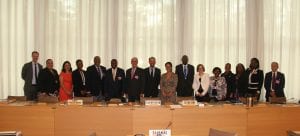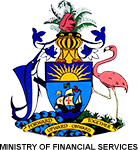Government WTO Negotiators ‘Armed And Dangerous’
24 Sep 2018
Private sector collaborates with the government on WTO accession

Government Negotiators at the 3rd Working Party Meeting on The Bahamas’ WTO Accession.
The Government’s WTO negotiating team will be made “armed and dangerous” through the highest possible level of private sector support, the Chamber of Commerce’s chairman is pledging.
Michael Maura told Tribune Business that the business community’s increasing collaboration with the Government, an effort that started one month ago, is intended to help The Bahamas achieve the best possible World Trade Organisation (WTO) membership terms by providing advice based on “fact not emotion”.
He was echoed by Zhivargo Laing, the country’s chief WTO negotiator, who said private sector involvement in the process is “absolutely critical” to maximising the potential benefits from The Bahamas’ entrance into the rules-based global trading regime.
He promised that the Government would return the business community’s support in-kind, even to the extent of negotiating team members stepping out of key WTO meetings to confer with private sector representatives on particular issues and positions before any agreement is reached.
The former Cabinet minister said the Minnis administration was also prepared to show the Chamber and private sector representatives a “sampling” of the goods and services offers already submitted, especially those areas “of potential concern” to specific Bahamian industries.
With the Bahamas’ WTO accession momentum starting to accelerate following last week’s Third Working Party meeting in Geneva, Mr. Maura said the Chamber had formed its own Working Group to help the Government advance this nation’s economic interests.
The Chamber of Commerce will conduct a WTO study
With the WTO having scheduled approval of The Bahamas’ full membership bid for June 2020, the Chamber chairman said the advocacy body was preparing to take “a deep dive” into the economy by conducting an impact analysis of its own to “understand how it ticks”.
“We’ve created this WTO Working Group, and ourselves and the Government’s negotiating team, led by Zhivargo Laing, have agreed to collaborate and work together as the Government advances accession and discussions at the WTO,” Mr. Maura said.
He added that the Chamber-commissioned study will support the Government’s own “comprehensive analysis of our economy”, and was intended to assist in finding “the best trade regime for The Bahamas” under the rules-based system enforced by the WTO.
“It will identify those areas that are a lag on growth to looking at those things we should be encouraging and facilitating and investing in, and enhancing those areas,” Mr. Maura told Tribune Business.
“What we’re looking at in the Chamber analysis will be a review of our legal framework and potential changes required to ensure we optimise the benefits coming to The Bahamas from trade liberalisation.
“While we’re keenly interested in the impact of any tariff reductions, changes and amendments may have, of equal importance is our legal framework that directly impacts the conditions of trade and business. We can then ensure that as we’re making these changes to the system from a border or services perspective that the intended objectives are realised as we have the legal framework to support them.”
Mr. Maura said the Chamber’s work aimed to provide the Government with the fact-based, data-driven economic evidence it needed when negotiating this nation’s terms of trade with other WTO members.
Both parties want the best outcome for The Bahamas
“Our efforts are intended to provide further information, further analysis to the Government and Zhivargo’s team so that they’re armed and dangerous going into these negotiations,” Mr. Maura told Tribune Business. “It’s important to get this economic analysis complete as you can’t negotiate from a place of emotion; you have to negotiate from a place of data and facts.”
Mr. Laing, in a separate interview, said he and the Government were firmly aware that The Bahamas’ successful accession to the WTO hinges on constant, two-way communication between themselves and the private sector.
“Not only did I make a commitment to that openness in that meeting,” Mr. Laing said of recent talks between the two sides, “but we made provision for the Chamber to get a full briefing not only on the strategies but the contents of the offer itself; what was put forward, and eye balling what the indicative offer was.”
With “time of the essence”, Mr. Laing said it would not be possible to go through every line item in The Bahamas’ goods and services offers, but the Government would provide “a sampling” of what had been submitted to the WTO. Included in this sample, he added, were “the ones that certainly will be of potential concern and interest to see exactly what we’re doing on those”.
“On an ongoing basis it is my expectation that as we get into the throes of these negotiations in more detail that we will have the ability to confer with Chamber representatives while still in attendance at these meetings,” Mr. Laing added.
The former minister said private sector involvement with the WTO process was “absolutely critical”, given that The Bahamas will be negotiating with countries whose representatives will largely be advocating for their own business communities.
“I want to be in the same position in our negotiations,” Mr. Laing told Tribune Business. “I want our stance to reflect the input of the private sector. We will not get all we want, and the other side will not get what they want. It means getting as best we can what was agreed between the public and private sectors, and the best outcome for The Bahamas.”
Darron Pickstock, who heads the Chamber’s trade and investment division, told Tribune Business that private-public sector collaboration was “paramount” if The Bahamas was to “get the best possible outcome” from WTO membership.
Pointing out that it was businesses who trade, not the Government, Mr. Pickstock said the Chamber was “very encouraged” by the Government’s commitment to openness and transparency over the process.
He called on the private sector to look beyond potential negatives associated with WTO membership to instead focus on the positives, especially how the negotiations could be used to open up access to foreign markets and provide certainty to incoming foreign direct investment – thereby positioning the Bahamian economy for future growth.
“One of the things we focus a lot on is the change and negative impact of WTO,” Mr. Pickstock told Tribune Business. “We’re really not putting enough focus on what we can get out of this.”
The Chamber has hired the KPMG accounting firm to assist with selecting a company to do its economic analysis. Mr Laing said the Government’s own study had modelled the consequences of multiple accession outcomes on indicators such as growth, revenue and jobs.
The Chamber’s WTO working group includes both Mr. Maura and Mr. Pickstock, Robert Myers, Ed Fields, Franklyn Butler, Anthony Ferguson and Karla Wells from Caribbean Bottling.
Source: The Tribune
Click here for more information on the WTO and the nation’s accession process.

